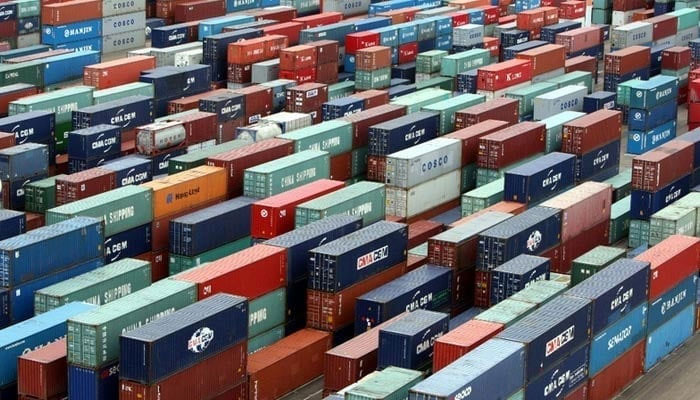Bangladesh eases clearance of all goods from Pakistan
Restrictions were imposed by Hasina Wajid government which was thrown out by people of country in August
ISLAMABAD: Bangladesh has scrapped the mandatory 100 percent physical inspection of all imported goods from Pakistan, a decision aimed at expediting Customs clearance and improving trade efficiency.
Well-placed sources said here Wednesday that the Bangladesh National Board of Revenue (NBR) has officially told the country’s Customs houses across Bangladesh about the development, explaining that the previous policy, which mandated manual inspections for all consignments from Pakistan under the National Selectivity Criteria of the ASYCUDA World system, was no longer necessary. Pakistan has been informed of the decision.
The restrictions were imposed by Hasina Wajid government which was thrown out by the people of the country in August this year. The move has come in the wake of Prime Minister Shehbaz Sharif’s meeting with Bangladesh Chief Adviser Dr Muhammad Younis late last month in New York on the margins of the United Nations General Assembly (UNGA) summit.
The NBR letter noted that customs officials at the assistant and deputy commissioner levels had been spending significant time clearing shipments through the “Red Lane” — a high-risk classification that requires both documentary review and physical inspection. However, it acknowledged that these inspections had yielded no significant findings. Given the absence of meaningful results from the physical examinations, the Dhaka Customs House proposed excluding goods from Pakistan from the National Selectivity Criteria, the letter says.
Under the ASYCUDA World system, shipments are categorised based on risk levels. Low-risk consignments pass through the “Green Lane,” which requires no inspections, while moderate-risk goods enter the “Yellow Lane” for document review only. High-risk goods are directed to the “Red Lane” for thorough inspection.
With the new directive, Pakistan’s exports will no longer be automatically classified as high-risk. Instead, Customs officials will implement a Product-Based Risk Management system under the local criteria, allowing more flexibility in handling Pakistani imports.
Bangladesh imports a wide range of products from Pakistan, including cotton, yarn, chemicals, wheat, plastic materials, leather, and petroleum products. Other notable imports include food items such as baby food, rice, and fruits, as well as surgical equipment and electric fans. The removal of mandatory inspections is expected to benefit businesses importing these goods, reducing delays and potentially lowering costs, the sources added.
-
 King Offers Harry, Meghan Markle A 30 Bedroom Lodge Despite Its Decades Of Baggage: ‘it’s An Olive Branch’
King Offers Harry, Meghan Markle A 30 Bedroom Lodge Despite Its Decades Of Baggage: ‘it’s An Olive Branch’ -
 Selma Blair Talks About How Her Debilitating Disease Is 'misunderstood'
Selma Blair Talks About How Her Debilitating Disease Is 'misunderstood' -
 China’s 5-year Tech Strategy: What To Expect At Annual Parliament Meeting Amid Rivalry With West
China’s 5-year Tech Strategy: What To Expect At Annual Parliament Meeting Amid Rivalry With West -
 Andrew’s Total Meltdown On The Day Of Eviction: Insider Breaks It Down Word For Word
Andrew’s Total Meltdown On The Day Of Eviction: Insider Breaks It Down Word For Word -
 Michael J. Fox Stuns Actor Awards Audience With Rare Confession Amid Parkinson's Disease
Michael J. Fox Stuns Actor Awards Audience With Rare Confession Amid Parkinson's Disease -
 Beatrice’s In-laws Stand Against Her Marriage: ‘Furious Their Son Is Wrapped Up In Wreckage’
Beatrice’s In-laws Stand Against Her Marriage: ‘Furious Their Son Is Wrapped Up In Wreckage’ -
 Jessie Buckley Utters 'wild' Remarks For 'Hamnet' Co-star Emily Watson At Actor Awards
Jessie Buckley Utters 'wild' Remarks For 'Hamnet' Co-star Emily Watson At Actor Awards -
 Who Could Replace Ayatollah Ali Khamenei? Iran’s Top Successor Candidates Explained
Who Could Replace Ayatollah Ali Khamenei? Iran’s Top Successor Candidates Explained -
 Oliver 'Power' Grant Cause Of Death Revealed
Oliver 'Power' Grant Cause Of Death Revealed -
 Michael B. Jordan Makes Bombshell Confession At Actor Awards After BAFTA Controversy: 'Unbelievable'
Michael B. Jordan Makes Bombshell Confession At Actor Awards After BAFTA Controversy: 'Unbelievable' -
 Prince William Willing To Walk Road He ‘loathes’ For ‘horror Show’ Escape: ‘He’s Running Out Of Allies Fast’
Prince William Willing To Walk Road He ‘loathes’ For ‘horror Show’ Escape: ‘He’s Running Out Of Allies Fast’ -
 Pentagon Says No Evidence Iran Planned Attack On US, Undercutting Strike Justification
Pentagon Says No Evidence Iran Planned Attack On US, Undercutting Strike Justification -
 Prince William’s Changes Priorities With Harry After Kate Middleton’s Remission: ‘It Couldn't Be Worse’
Prince William’s Changes Priorities With Harry After Kate Middleton’s Remission: ‘It Couldn't Be Worse’ -
 Justin Bieber Gets Touching Tribute From Mom Pattie Mallette On Turning 32 Amid Limited-edition Birthday Drop
Justin Bieber Gets Touching Tribute From Mom Pattie Mallette On Turning 32 Amid Limited-edition Birthday Drop -
 Jada Pinkett Smith Details How Her Memoir Combats 'shame' Around Alopecia
Jada Pinkett Smith Details How Her Memoir Combats 'shame' Around Alopecia -
 Harrison Ford Reflects On Career As He Receives Life Achievement Award At 2026 Actor Awards
Harrison Ford Reflects On Career As He Receives Life Achievement Award At 2026 Actor Awards




